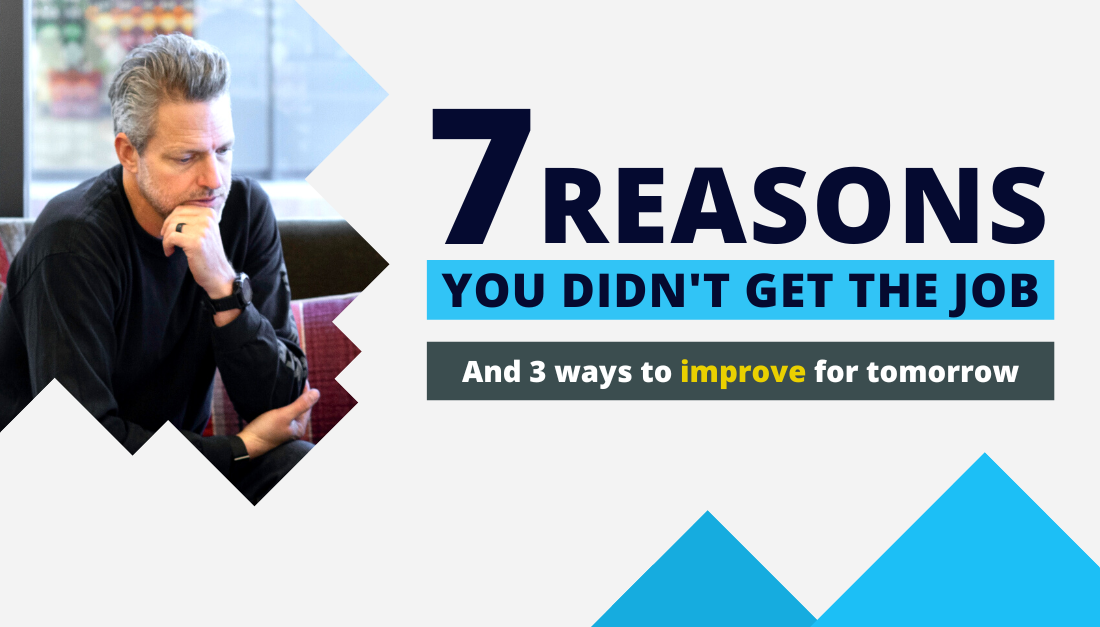
7 reasons Why You Didn't Get The Job (+ 3 ways to improve for tomorrow)
Almost every month I get an email from a job seeker who is distraught about getting passed up for a job.
When I ask them what went wrong, 99% of the time they’ll say, “I’m not sure. I did everything right!”
The simple truth is that interviewing is a two-way street.
You may have done everything right in your interview. But, that doesn’t mean you’re guaranteed to get the job.
If you're asking yourself, "why didn't I get the job?" after your job interview, this post is for you.
For this post, I wanted to invite certified career coach and recruiting expert, Laura Leuillier, to explain:
- The most common reasons why you didn't get the job (even if you are perfectly qualified)
- What factors are OUT of your control
- What factors are IN your control
- What you can do to improve and make sure you ace your next interview
Laura is an incredible career coach and her results speak for themselves.
So, without further adieu, here is Laura Leuillier.

Laura Leuillier is a professional Career Coach who has helped 300+ global professionals make bold career moves, land dream jobs, and start profitable side hustles.
Thank you Bogdan! This is such an important topic because if you can separate what’s out of your control, then you can concentrate on maximizing what is in your control.
Let’s start with 3 reasons you might not have gotten the job that are out of your control and then I’ll jump into how to improve what is in your control.
Let’s dive in!
3 Reasons why you didn't get the job that are BEYOND your control
1. They hired internally
Sometimes a hiring manager already has a specific internal person in mind to fill a job opening. If that’s the case, it can be near impossible to beat out an internal candidate.
(Note: they’ll still post the job opening because they’re required to by law)
It’s very difficult to compete with internal candidates mainly because they will be able to hit the ground running immediately. Also, the hiring manager already knows the skills and capabilities of internal candidates, making it easy for them to visualize the impact this person will have in the role.
2. Budget issues caused the job to be cancelled/changed
Budgets aren’t set in stone. When the economy is unstable, budgets and open roles can quickly change. It may be the case that the entire hiring process may have been delayed (or cancelled) while the company figures out its financial situation.
3. Someone else was a better networker
As we’ve covered before, recruiters rank candidates based on how they came into the hiring process. Most recruiters prefer candidates that came in via referrals or word of mouth recommendations. If another candidate has been networking with employees and decision makers from the company, they might get chosen over an outside candidate.
If you’d like to learn how to network for a job, you can read this guide.

4 Reasons why you didn't get the job that are WITHIN your control
While it might be frustrating not being chosen for things out of your control, it’s important not to get hung up on them.
What you can do is make sure you maximize the things that ARE within your control.
When it comes to having a successful job search, there are a LOT of things that are within your control. Many of these things aren’t very difficult to do either.
The problem is that most people just don’t know what they are.
Here are four ways you can start to improve your interviews in 30 minutes or less:
How to Prepare For Your Interviews Better
One reason you might not have gotten the job is because your interview answers:
- Were generic or didn’t show you understand the role
- Failed to explain how your experience is valuable
- Didn’t align with the requirements in the job description
If your interview prep focused mostly on researching the company and the hiring manager, you may have made a super common mistake that many other job candidates make.
If that’s the case, don’t worry.
The best way to prepare for an interview isn’t rocket science. Here’s what to do:
1. Prepare interview stories
The best interview answers use storytelling to give specific examples that demonstrate you have the exact skills the employer is looking for. One easy way to improve your interview outcomes is by reviewing the job description before the interview.
After you review the description, try to to think of some interview stories you can share about some of the things in the job description.
For some guidance, here’s a great video by expert career coach, Jess Smith:
2. Practice your interview answers
It’s impossible to predict every question you’ll get asked in a job interview, but there are some classics that you can pretty much guarantee you’ll have to answer.
These include:
- “Tell me about yourself.”
- “Why do you want to work here?”,
- “What are your strengths and weaknesses?”
Sometimes the reason that you didn't get the job can simply be because on of these questions catches you off guard.
I recommend you prepare your answers to these questions in advance and tailor them to the role and company. Here’s a helpful video by Biron Clark, CEO and Founder of the website CareerSideKick, that talks about how to answer the “Tell me about yourself” question:
3. Tame your nervousness
Perhaps the most common reason highly-qualified candidates don't get the job is because their nerves get the best of them.
Communication is one of the most important skills when it comes to interviewing. If you let your nerves get the better of you, you’re not going to make a good impression on the hiring manager.
Things like using a lot of filler words, lack of eye contact, or rambling answers are signs that your nerves may be getting in your way.
The best way to get around this is to practice your answers on your own. You want to get all your nerves out while you’re by yourself so that you feel confident when you’re in the hot seat of the interview.
You can use Bogdan's free interview toolkit here, which I highly recommend. It has an interview timing tool, practice questions, and a bunch of other goodies that are super helpful.
Here’s a great video by Bogdan (from his free interview course) that I think is particularly helpful for overcoming nervousness:
4. Show them you want it
After you’ve done proper interview preparation, the final step to acing your interview is showing them that you truly want the job.
Hiring managers want to work with people who are genuinely excited about the opportunity and people who genuinely love what they do.
You can be the most qualified, most experienced candidate, but if you don’t come across as someone who really cares about the role, you’re unlikely to get hired.
So, be yourself in the interview. Let your personality shine through and don’t hold your enthusiasm back. Enthusiasm is contagious and can help get the hiring manager on your side, giving you an advantage over other candidates who lack the same level of interest.
And of course, after the interview is over, write a great thank you email to show you truly do want the role.
Remember, every interview is a new opportunity. Just because this one got away, doesn’t mean that another isn’t around the corner.
Prepare now, so when the next one comes along, you’re ready to ace it!
To learn more about me and what I do, please follow me on LinkedIn & Instagram and be sure to check out my website here.
Now, I'll hand it back over to Bogdan to sum up the...
Takeaways & Next Steps
Thanks Laura! As Laura explained, taking control of your job search is all about focusing on the things that are in your control and ignoring the things that aren't.
While it might be tempting to obsessively ask yourself, "why didn't I get the job?" or "I should have said this or that instead," those thoughts won't help you improve.
The interview outcome is what it is.
As you can see, there are a number of reasons you didn't get the job, some that are completely out of your control.
Regardless, it's best to move on and focus on what you can do in the future.
To recap, the four things you can do today to improve for your next interviews are:
- Prepare interview stories
- Practe your interview answers
- Tame your nerves
- Show them that you want the job
If you enjoyed this post and want more like it, I recommend reading the following:
3 Trick Interview Questions and How to Answer Them
How to beat the ATS (Applicant Tracking Systems)
4 Best Resume Builders that Can Help You Get Hired
And, if you'd like the resume and interview courses mentioned in the post above, you can drop your email below and you'll get them straight to your inbox.
---
Read more resume, LinkedIn, and interview best practices on The GHYC Blog.Get 1-on-1 Help
Need to land your job ASAP? Fast forward your job search with some 1-on-1 help! 👇
More from the blog

How To Ask Why You Didn’t Get the Job (That Will Actually Get a Reply)
How To Ask Why You Didn’t Get the Job (that will actually get a reply) "Thank you for your...
77 LinkedIn Headline Examples That Will (actually) Get You Noticed
77 LinkedIn Headline Examples That Will (actually) Get You Noticed According to a recent JobVite...
7 Creative Job Application Ideas To Get an Employer’s Attention
7 Creative Job Application Ideas To Get an Employer’s Attention If you’ve been applying to jobs...
Like this? Try our free courses!
Tired of sending your job applications into a black hole and never hearing back? Get hired faster with our guided courses all for FREE!